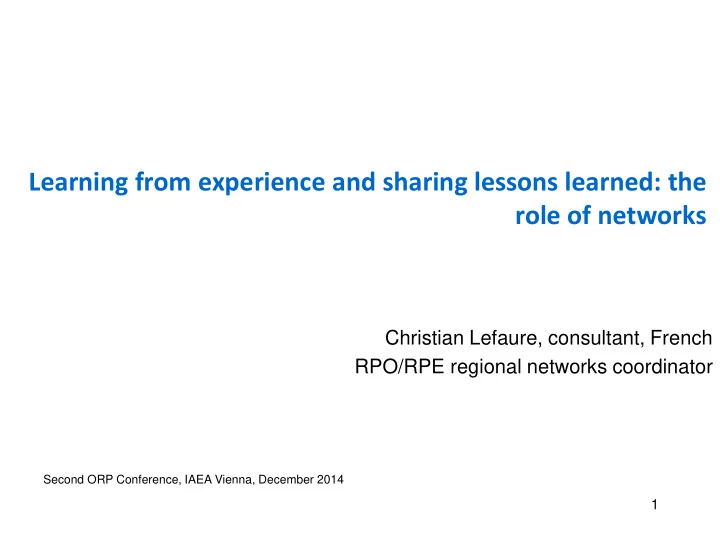

Learning from experience and sharing lessons learned: the role of networks Christian Lefaure, consultant, French RPO/RPE regional networks coordinator Second ORP Conference, IAEA Vienna, December 2014 1
The two generations of networks* 1/ the first, mainly dealing with scientific aspects of radiation protection and technical measurements evolution, HP professionals in the 50 ’s and 60 ’s at the national level 2/ the second, mainly dealing with practical exchange of experience for dose management, all stakeholders concerned with (occupational) risk management, in the 90 ’s and later at regional levels (international or local) ISOE; European ALARA Network : the first 2 in 1992 and 1996; ARAN, RECAN, REPROLAN, EMAN, EAN NORM, ERPAN, HERCA… all devoted to feedback experience exchanges in a sector (nuclear, medical… ) or in a region (Europe, Asia, Latin America,…) in order to improve the radiological protection practices The emergence of that second generation has been favoured by new standards, socio-political and technological evolutions 2 • The Evolution of Networking in radiation protection: From health physics professionals expertise to all concerned stakeholder’s involvement. IRPA 12, 2008 Buenos aires
Learning from experience and sharing lessons learned We can say that this is the main purpose of all these new networks They all organize meetings where professionals from the spot (not only health physicists, but also specialists of other risks management, labour physicians,… ) physically meet to exchanging among their experience and practices, their problems to be solved during an operation, in designing a job, a workshop, a new installation, a dismantling, a feedback system … the solutions found and their comparisons the impact of new regulations on their practices… They all provide recommendations covering all the previous mentioned topics and addressed to all types of concerned stakeholders : regulatory bodies, managers, trainers for radiological protection, workers, contractors… 3
Learning from experience and sharing lessons learned (for example) EAN has held 15 workshops in less than 20 years on very various topics such as ALARA and “decommissioning, internal exposure, industrial radiography, medical and radiopharmaceutical sectors, NORM, holistic approach, inspection and self assessment, waste management, security of sources, existing exposure situations” More than 100 recommendations from these workshops from the beginning and from the beginning they pointed out the importance of some keywords that are regularly mentioned “ALARA culture, workers’ involvement, SH commitment, awareness,…” 4
Learning from experience and sharing lessons learned (II) Most of these networks allow to create a community of professionals* working ”on the spot”, regularly communicating through modern means such as e- mails, web, video conferences… They are a key element in elaborating a common ALARA culture, among all types of stakeholders within utilities. Some of them even organize specific workshop on training (EUTERP, eventually in cooperation with EAN in 2014), or provide specific feedback experience analysis on incidents, and make it available as tools for trainings (RELIR and OTHEA) or provide translations of training material to their members FAQ on ALARA (REPROLAN, EAN)) Participation to a network life may become officially recognized as part of the “certification” for some stakeholders, as will be illustrated now . * See The international System on Occupational Exposure , an ALARA Success 5 Story…NEA/CRPPH/R( 2013)6
The example of the French RPO/RPE networks (I) 10 years ago, many RPO felt isolated, with few legitimacy, they needed exchanges of experiences and updating of knowledge Voluntaries set up networks 2008 2010 2012 2014 networks 3 7 12 15 members 300 700 1100 1900 Covering the French territory All inter-sectors (medical, research and non nuclear industry) A national coordination set up in 2011
The example of the French RPO/RPE networks (II) Each network organizes 2 one day workshops per year in its region. Regulatory body representatives provide there analysis of regulation evolutions and share lessons learned from their inspections. Epidemiological studies and other technical studies are presented by specialists Most important are presentations by participants of their problems, and discussions of solutions. These days give opportunities for exercises of dose assessment and practicing dose rate or contamination measurements in “real” situations with specialists firemen. Finally, networks are now the main providers of new incident cases and analysis for the RELIR OTHEA system. An agreement was signed in 2013 between the coordination and RELIR.
The example of the French RPO/RPE networks (III) All this can be considered as in service training provided by voluntaries and specialists in the networks to other voluntaries. Even if very “young”, this has already been recognized by regulatory bodies; there is a willingness that this “in service training” should become part of the renewal of RPO certification. Therefore the new French regulation on RPO’s training has been modified according to that willingness. Any network could then become partner of certified training organisations. A convention will have to be signed and clarifying the quality of the training and allowing to check the knowledge acquisition. This is a good example of the role of networks in learning from experience and sharing lessons learned. ( see ESTRAD contribution )
Recommend
More recommend